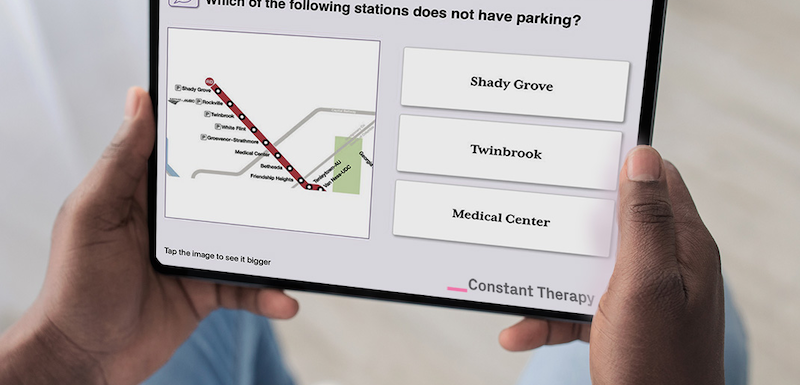
Source: iStock/Constant Therapy
Copyright: iStock/Constant Therapy
URL: https://formative.jmir.org/2022/9/e34450
License info: Creative Commons Attribution (CC-BY)
Study Evaluated the Feasibility of Long-term Home-Based Digital Cognitive Therapy for Patients With Alzheimer Disease With Mild Cognitive Impairment and Mild Dementia
LEXINGTON, Mass. – September 12, 2022 – Constant Therapy Health, a brain health digital therapeutics company, announced today the publication of a feasibility study of its Constant Therapy digital cognitive therapy platform in JMIR Formative Research, titled, “Home-Based Electronic Cognitive Therapy in Patients With Alzheimer Disease: Feasibility Randomized Controlled Trial.”
The study, conducted by the Alzheimer’s Disease Research Center and Department of Behavioral Neuroscience at Boston University School of Medicine, in collaboration with the Center for Translational Cognitive Neuroscience at the Veterans Affairs Boston Healthcare System, concluded that long-term computerized cognitive training using Constant Therapy is feasible for patients with Alzheimer disease (AD) in the mild cognitive impairment (MCI) and mild dementia stages. Patients engaged more with Constant Therapy than with paper-and-pencil training over the 24-week study period and improved their performance over time.
The goal of the study was to determine the feasibility of a long-term home-based cognitive training intervention for patients with mild dementia from Alzheimer’s disease. While medications available have been shown to help slow disease progression in AD, supplementing pharmacological interventions with non-pharmacological interventions has been shown to sustain cognition and quality of life more than medications alone. We found that patients in the treatment cohort were able to use Constant Therapy daily and consistently for the entire study period of 24 weeks. We are encouraged by the results and believe that these findings support the development of future randomized, controlled trials to further investigate the efficacy of digital therapeutics like Constant Therapy to sustain cognitive function in patients with AD. [Dr Andrew Budson, senior author; associate director, the Boston University Alzheimer’s Disease Research Center; professor of neurology, Boston University School of Medicine; and chief of Cognitive Behavioral Neurology, the Veterans Affairs Boston Healthcare System]
The study included a total of 19 patients, all aged between 50 and 90 years with a diagnosis of MCI secondary to AD or mild Alzheimer dementia, and were randomized into the experimental group, which used Constant Therapy, or the active control group, which was administered paper-and-pencil games. Patients were assessed using the Repeatable Battery for the Assessment of Neuropsychological Status (RBANS) every 6 weeks. Feasibility analyses were computed for participants who completed 24 weeks of Constant Therapy and found that long-term use of the Constant Therapy program was feasible, using it for approximately 32 minutes daily with an adherence rate of 80% (121 out of 168 days). These participants showed an overall improvement in accuracy and latency (P=.005) in the Constant Therapy scores, as well as specific improvements in tasks related to visual and auditory memory, attention, and arithmetic. The Constant Therapy group displayed an improvement in the RBANS coding subtest. No unexpected problems or adverse events were observed.
With tens of thousands of users and over 200 million exercises completed with Constant Therapy, we have shown that home-based cognitive therapy is a viable and effective rehabilitation tool for those with speech, language and cognitive disorders. In Alzheimer’s disease, where the patient population may go months between clinician visits and assessments, having an option that is accessible and easy to use is critical. This latest study shows that Constant Therapy is a promising digital home-based option for people with Alzheimer’s disease with mild dementia or MCI, to help patients maintain cognitive and communication skills longer. [Veera Anantha, PhD, chief executive officer and founder, Constant Therapy]
About Constant Therapy Health:
Constant Therapy Health is a next-generation digital therapeutics company whose technology is clinically proven to improve the efficacy of cognitive, speech, and language therapy, as well as increase access to and reduce the cost of therapy. Constant Therapy, an award-winning mobile program, uses patented artificial intelligence technology to deliver personalized exercises that rebuild cognitive and speech function for individuals recovering from stroke or traumatic brain injury or living with aphasia, dementia, and other neurological conditions. Built by a team of top neuroscientists at Boston University, Constant Therapy is used by tens of thousands of patients and clinicians, helping to create the world’s largest brain rehabilitation database and providing insights that can improve the effectiveness and efficiency of brain rehabilitation. Visit our website and follow us on LinkedIn to learn more or to partner with us.
Media Contact:
Helen Shik
Shik Communications LLC
617-510-4373
helen@ShikCommunications.com
Original article:
Marin A, DeCaro R, Schiloski K, et al. Home-Based Electronic Cognitive Therapy in Patients With Alzheimer Disease: Feasibility Randomized Controlled Trial. JMIR Form Res. 2022;6(8):e34450
URL: https://formative.jmir.org/2022/9/e34450/
doi: 10.2196/34450
About JMIR Publications:
JMIR Publications is a leading, born-digital, open-access publisher of 30+ academic journals and other innovative scientific communication products that focus on the intersection of health and technology. Its flagship journal, the Journal of Medical Internet Research, is the leading digital health journal globally in content breadth and visibility, and it is the largest journal in the medical informatics field.
To learn more about JMIR Publications, please visit https://www.jmirpublications.com or connect with us via YouTube, Facebook, Twitter, LinkedIn, or Instagram.
If you are interested in learning more about promotional opportunities, please contact us at communications@jmir.org
The content of this communication is licensed under the terms of the Creative Commons Attribution License (https://creativecommons.org/licenses/by/4.0/), which permits unrestricted use, distribution, and reproduction in any medium, provided the original work, published by JMIR Publications, is properly cited. JMIR is a registered trademark of JMIR Publications.
